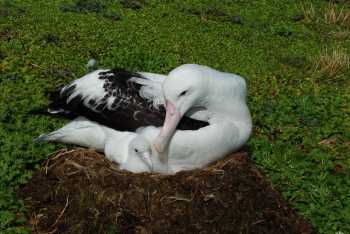Henri Weimerskirch (Centre d'Etudes Biologiques de Chizé, Villiers en Bois, France) and colleagues writing in the journal Science this month have looked at the seemingly positive effects of climate change on Wandering Albatrosses Diomedea exulans.

The paper's abstract follows:
"Westerly winds in the Southern Ocean have increased in intensity and moved poleward. Using long-term demographic and foraging records, we show that foraging range in wandering albatrosses has shifted poleward in conjunction with these changes in wind pattern, while their rates of travel and flight speeds have increased. Consequently, the duration of foraging trips has decreased, breeding success has improved, and birds have increased in mass by more than 1 kilogram. These positive consequences of climate change may be temporary if patterns of wind in the southern westerlies follow predicted climate change scenarios. This study stresses the importance of foraging performance as the key link between environmental changes and population processes."

A Wandering Albatross broods its downy chick
Photograph by Genevieve Jones
Reference:
Weimerskirch, H., Louzao, M., de Grissac, S. & Delord, K. 2012 Changes in wind pattern alter albatross distribution and life-history traits. Science 335: 211-214 + 11 pages of supporting online material (SOM).
John Cooper, ACAP Information Officer, 15 January 2012

 Français
Français  English
English  Español
Español